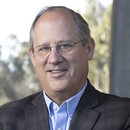Inductees to the 2019 CIO Hall of Fame included just one representative from higher education: Vince Kellen, CIO at the University of California San Diego.
Kellen is notable for what he builds beyond IT: strong teams and consensus among disparate stakeholders. EdTech spoke to Kellen about recent highlights of his tenure, including a major system redesign, a data analytics initiative and a cross-campus focus on collaborative leadership.
EDTECH: You’ve worked with a number of institutions. What appealed to you about UC San Diego?
KELLEN: A lot of things, but most important was the quality of the executive team and the fact that there’s an outstanding level of collaboration across the university. Under Chancellor Pradeep Khosla’s superb leadership, our focus is sharp and clear, and the vision is strong. This helps quite a bit in ensuring IT can support and enhance our mission.
EDTECH: Tell me about the major redesign that you’re taking the university through.
KELLEN: It’s a comprehensive digital transformation of every single enterprise business system we have. We’re replacing our decades-old mainframe systems with modern, cloud-based software tools. We’re also building a comprehensive advanced analytics platform from scratch.
These are just the technical changes. The business changes are more of a challenge. I got the entire IT staff in my unit certified at the yellow-belt level in Lean Six Sigma, and I require all my frontline managers to achieve green-belt certification. Now, more than 2,200 UC San Diego staffers, including 400 in IT, have gone through some sort of certification, creating a great culture of measurable, continuous improvement.
EDTECH: The CIO judges noted your success in building trust among senior leaderships and facilitating a shared governance approach to institutional goals. How does this work at UC San Diego?
KELLEN: Our No. 1 mission in IT is to help business colleagues execute their strategies. We try hard to be helpful in key decisions and planning, and so far, IT has been well included in the cocreation of strategies with strong digital components. We have to have quality individuals with high acumen to continually be included.
Also, because of the ongoing complexification of information, solitary players are a thing of the past. It takes several teams working together. We work hard to develop a strong community of trusted peers, so people trust that data are being used in ways that respect the community’s principles and values. When trust increases, data democratization increases.
EDTECH: One of your initiatives was to bring high-speed analytics to the university, making it possible to track student success. How are you implementing this?
KELLEN: Even though our students perform at an elite level, the university remains focused on improving teaching and learning, and we're planning to hire an associate vice chancellor for innovation for education. To prepare for that, we built an innovative, high-speed analytics infrastructure. It includes 15 years of student data, including all our data on institutional enrollment, retention and graduation rates, side by side with data from our key learning systems and advising tools.
EDTECH: What advice would you give IT leaders who want to expand the IT function in their institutions?
KELLEN: Realize that you can’t do it alone. Develop your network, work tirelessly in service of others and build a coalition of the willing that can help IT accomplish what it needs to.
Getting to this level of teamwork is very, very hard. It requires people who are expert collaborators and team members. To survive and thrive over the next few decades in higher education, IT leaders need to cultivate patience, understanding, empathy and team play. Working with teams that both challenge each other and care for each other is rewarding. But you have to intensely love what you do to develop this over time.
EDTECH: What’s next on the horizon for you and UC San Diego?
KELLEN: Right now, we’re working on how our IT unit will need to evolve and change, especially as we complete our enterprise system changes. IT will need to support continued productivity growth in administration so we can allocate more resources to our core mission of teaching and research.
We also need to continuously build talent, including increasing the number of women and minorities working and advancing in IT. We have shortages in key areas, so we’re looking at how to boost not just our agility but our ability to learn things faster. In order to deliver better solutions, we are going to need to make better humans.












